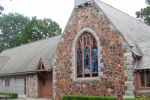May 31, 2024
Church as Community Center
This is part one of a three-part series. Read part two here.

Back in 2016, Church of the Ascension in Lexington Park, MD and St. George’s Church in Valley Lee, MD – the two campuses of what is now Resurrection Parish in the Episcopal Diocese of Washington – were entering into a covenantal, yoked relationship. Fearing uncertainty or some measure of loss, one member said to another: “I know the plan: Ascension will become a community center, whereas St. George’s will be the church.” (I’ll bet you can tell which worshipping community that person attended.)
There was no plan that went into that amount of detail. And if there were such detail, that was not on the plan – keeping one building a church and making the other a community center.
It’s an odd statement, though, isn’t it? I mean, what’s the difference between a church and a community center, if the community center is also at the same time, technically at least, a church? More simply: what is a church if it’s not also a center for its community?
In this series of three blog posts, I want to share the journey that Resurrection Parish (Ascension & St. George’s) have been on, and how much we’ve had the opportunity to lean into church-as-community-center, or community center church. For starters, in today’s first post, here’s what got us started.
It was a very hot afternoon in the summer of the pandemic. A parishioner and I were helping a local couple pack boxes and get their truck ready for a cross-country move. The departing husband-and-wife were the retiring Executive Director and Counselor of our local Pastoral Counseling Center (PCC) – an amazing, impactful, but perennially struggling ministry in our community. PCC provides professional, affordable, mental health and behavioral counseling to anyone in need, regardless of whether or how much they can pay. They request a minimum donation of $35 / session, and more than 60% of their clients couldn’t make that. PCC had approximately 100 clients. That’s 100 families or couples or individuals -- whether or not they had health insurance, whether they could pay out of pocket the bare minimum or not.
What made it even more an issue was that the Pastoral Counseling Center is based at the Episcopal Church of the Ascension in Lexington Park, MD – one of the two campuses of Resurrection Parish, the parish I serve as rector. That part of Lexington Park, MD is an underserved, struggling community, mostly where the working poor live. That’s where Ascension is planted, to the glory of God, and we’re proud to call our neighborhood home. In fact, Church of the Ascension helped launch PCC in the early 1980s and regularly invested in the ministry, even as PCC became a separately incorporated non-profit by the early 1990s. I was on PCC’s Board in 2020 and I knew we had a problem on our hands … or an emerging opportunity. What were we going to do now that the Executive Director and Counselor were leaving? Not only how were we (the Board) going to keep the Center open but also – and more terrifying – how were we going to ensure that we wouldn’t negatively impact the community that so desperately needed and received those services?
Back to that moving day in the summer of 2020. I think the truck was late, or we were waiting on others to finish inside. On the porch, my parishioner asked me: “What is PCC going to do now?”
That question was at that very moment morphing into an answer, and a really exciting one. A local for-profit counseling agency in our County – established a few years before by friends of mine – was interested in talking about a partnership with PCC. They knew of PCC’s caseload, and they wanted to figure out a way to ensure that mental health counseling would remain in an underserved community such as ours. Under the terms of the agreement, the for-profit counseling agency would provide staffing for PCC (essentially deploying their counselors as PCC counselors) and back-office billing / insurance support and networking opportunities, while PCC would continue to fulfill and offer its mission and remain at Church of the Ascension and in downtown Lexington Park. Turns out, you can’t just shut down a counseling / medical practice anyway, so the Board would’ve needed to find a local practitioner(s) to take all those active cases.
But I had another idea, too. Was my parishioner asking about what we, the church, were going to do?
You see, we’d been out of our church building for a while by then (thank you / no thank you, Covid). We’d learned to connect in virtual space. We focused little on maintaining the local distinctness of our buildings of worship. Our nation was also facing collectively the brokenness of racial disparity, and I knew that we couldn’t call ourselves a Christian church in an underserved community if we didn’t come out bolder, different, transformed, and changed. Sure, many Episcopalians have progressive values and a stated commitment to welcome all persons. Lots of us even desire to share our physical buildings and church campuses. But how is that moving the needle? How is that leading to transformation? How is that changing the hearts and minds of those inside, not to mention the community outside of our four walls?
I came to realize that there’s a big difference between having tenants and working with partners. There’s a world of difference between co-existing side-by-side with other organizations who rent our spaces and truly putting all our cards on the table. The former is neat and tidy, but it doesn’t change the community. Nor does it change the world, mostly because it doesn’t change me; it doesn’t change us.
“Would you be interested,” I asked our parishioner, “in talking about a big change?”
“What do you have in mind?” he asked.
So, in this series, I want to share what we’ve been up to – we at Resurrection Parish in the Diocese of Washington, notably our two campuses: Church of the Ascension in Lexington Park and St. George’s Church in Valley Lee. We had a series of problems that we flipped into opportunities. And we built some conceptual clarity as early as possible around what something so bold and so big could be, and could look like. And I also want to share where we’re going, as we look forward to God’s more preferred future … for us, and for The Episcopal Church.





